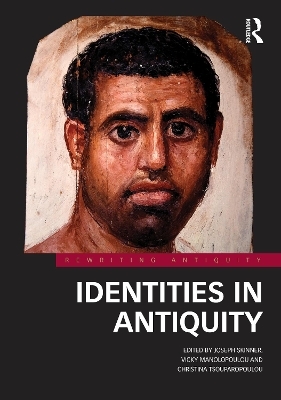
Identities in Antiquity
Routledge (Verlag)
978-1-138-54516-8 (ISBN)
- Noch nicht erschienen (ca. März 2025)
- Versandkostenfrei innerhalb Deutschlands
- Auch auf Rechnung
- Verfügbarkeit in der Filiale vor Ort prüfen
- Artikel merken
Identities in Antiquity is multi-disciplinary platform for the synthetic study of ancient identities, set in a more rounded and inclusive notion of Antiquity.
The volume showcases methodological and theoretical approaches to the study of ancient identities by scholars from different disciplinary backgrounds and career stages. In doing so, it promotes a more holistic approach to the study of ancient identities, facilitating comparisons between different periods and disciplines and generating new knowledge in the process. Chapters illustrating the intersecting, multifaceted, and mutable (or else highly immutable) nature of ancient identities address themes such as ethnicity, race, gender, mobility, religion, and elite and sub-elite identities – most notably that of the enslaved – in case studies spanning the ancient Mediterranean world and beyond, from the third millennium BCE until the early Middle Ages.
The volume is suitable for students and scholars working on the Ancient Near East, the Graeco-Roman Worlds, Late Antiquity, and Byzantium, offering a valuable contribution to the study of past identities and the internal workings of ancient societies.
Joseph Skinner is Senior Lecturer in Ancient Greek History at Newcastle University. His publications include The Invention of Greek Ethnography: From Homer to Herodotus (New York, 2012), and (as co-editor) Ancient Ethnography: New Approaches (London, 2013) and Herodotus and the Long Nineteenth Century (Cambridge, 2020). Vicky Manolopoulou is Research fellow in Environmental History at Ca’Foscari University, Venice. Her work centres on the intersection of landscape studies, environmental humanities and the history of emotions, focusing on the Eastern Mediterranean during the first millennium. Key research interests include human environment interactions, emotions, ritual and mnemonic landscapes. Christina Tsouparopoulou is Assistant Professor in Near Eastern Archaeology and History at the Cardinal Stefan Wyszynski University in Warsaw and an Honorary Research Fellow at Durham University. Her work bridges the material, visual, and textual culture of the ancient Near East and Eastern Mediterranean.
Introduction (J. Skinner, V. Manolopoulou, and C.Tsouparopoulou); Part I Approaching Ancient Identities; 1. Challenging essentialism: disentangling ancient and modern notions of ethnicity (J. Siapkas); 2. Elite Identities: Greece and Egypt in comparative perspective (M. Haysom); 3. The identities of enslaved persons (K. Vlassopoulos); 4. Personal names and Identity: A socio-onomastic approach to naming practices in the ancient world (A. Gavrielatos); 5. Religious identities in ancient cities (J. Rüpke); 6. Open dynamic custodianship: alternatives to understanding diversity and transformation (E. Isayev); Part II The Ancient Near East; 7. Construction of Gender Identities in Mesopotamia (S. Svärd & A. Garcia-Ventura); 8. Mercantile and Religious identities in Anatolia in the Middle Bronze Age (Y. Heffron & N. Highcock); 9. The identity of enslaved persons in ancient Mesopotamia (N. Reid); 10. Exilic Communities in Babylonia (L. Pearce); 11. Ancient Judaism: Ethnicity or Religion (E. Gruen); Part III The Mediterranean world until the age of the Successors; 12. A community of practice perspective on craft production and culture change in the Bronze Age Cyclades (N.Abell); 13. The resilience of a “non-people”: The case for a reconstructed Phoenician identity (C. López-Ruiz); 14. Transcultural Tokens of Identity: The Mechanics of Crossing Borders in the Ancient Mediterranean (D. Demetriou); 15. Classical Greek racism (T. Harrison); 16. Race and the Athenian Metic (R. Futo-Kennedy); 17. Greek Local Identity and Greek Local History (D. Tober); Part IV The Roman World: From Early Republic to late empire; 18. Roman Aristocratic Family Identity in the Late Republic and Early Empire (G. Farney); 19. Identities of Enslaved Persons in the Roman World (C. Bruun); 20. Identity construction in Alexandria: Greeks, Jews and Romans (K. Czajkowski); 21. Roman Military Identities (A. Gardner); Part V From Late antiquity until the early middle ages, and beyond: Rome, Byzantium and others; 22. Peripheral Identities: ethnicity, Anglo-Saxons and the Stützarmfibeln (J. Gerrard); 23. Goths, Huns and Vandals: the identity of the Huns. (H. J. Kim); 24. Sacrifice, Banquets, and Drunken Elephants: The Problem of Christian Identity in Libanius’s Oratio 30. (R. Falcasantos); 25. The Open Secret of Byzantine Nationalism. (A. Kaldellis); 26. Demarcating Rome: on the papal strategy of Othering and the re-invention of Greeks. (C. Gantner); 27. The Case of Manuel I Komnenos: Articulating Identity through Gender, Sexuality, and Racialisation (R. Betancourt).
| Erscheint lt. Verlag | 12.3.2025 |
|---|---|
| Reihe/Serie | Rewriting Antiquity |
| Zusatzinfo | 1 Tables, black and white; 53 Halftones, black and white; 53 Illustrations, black and white |
| Verlagsort | London |
| Sprache | englisch |
| Maße | 174 x 246 mm |
| Gewicht | 453 g |
| Themenwelt | Geisteswissenschaften ► Archäologie |
| Geschichte ► Allgemeine Geschichte ► Mittelalter | |
| Geschichte ► Teilgebiete der Geschichte ► Religionsgeschichte | |
| Religion / Theologie ► Christentum ► Kirchengeschichte | |
| ISBN-10 | 1-138-54516-3 / 1138545163 |
| ISBN-13 | 978-1-138-54516-8 / 9781138545168 |
| Zustand | Neuware |
| Informationen gemäß Produktsicherheitsverordnung (GPSR) | |
| Haben Sie eine Frage zum Produkt? |
aus dem Bereich


